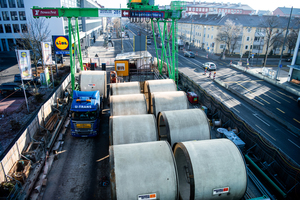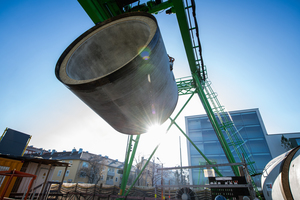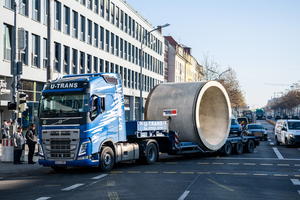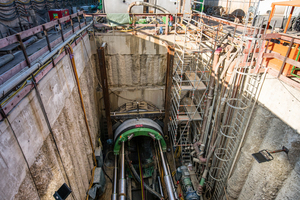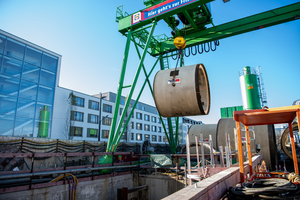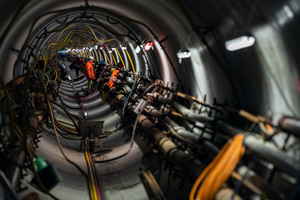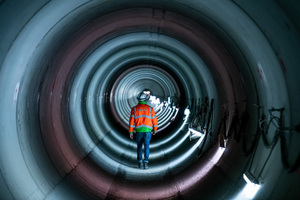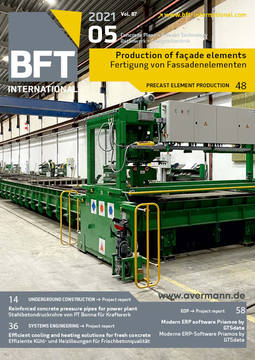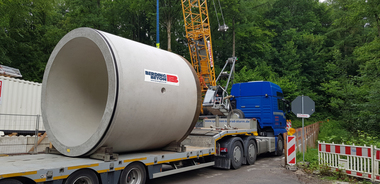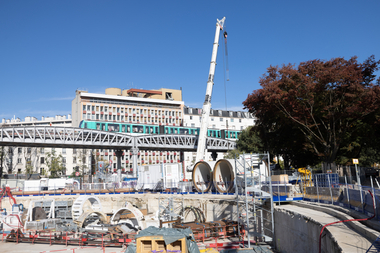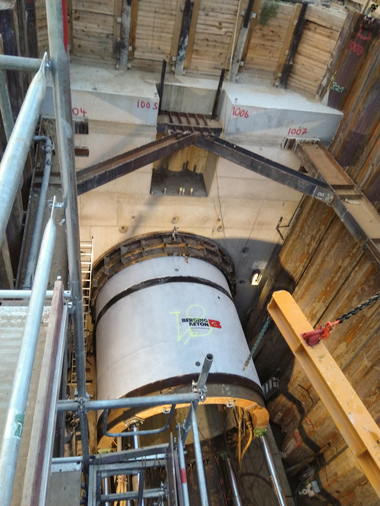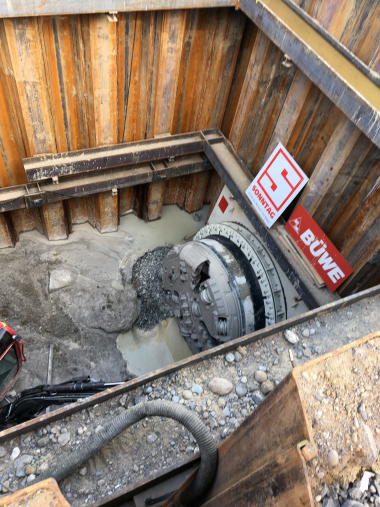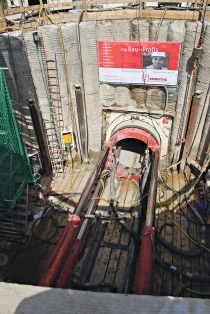2.2 km of DN 3000 reinforced-concrete jacking pipes for new sewers
Within the scope of the project “Sewer rehabilitation Landsberger Strasse,” 735 jacking pipes from Erding Beton were installed over a total jacking length of 2,195 m to achieve a significant improvement of the hydraulic situation in the drainage network in the west of Munich.
Increasing sealing of surfaces in particular in large cities and the more frequent occurrence of heavy-rain events result in considerable quantities of sewage that overload the sewer systems. The decision was made for the construction project “Sewer rehabilitation Landsberger Strasse” to achieve a significant improvement of the hydraulic situation in the sewer network in the west of Munich. The objective was to relieve the existing and often overloaded sewer system in the area of Pasing and Laim and to divert better and more effectively the critical flows of combined wastewater in the east and/or west of Munich by a new sewer 3 m in diameter.
The first partial construction section in the area of “Offenbachstrasse” up to “Am Knie,” as well as part of “Laimer Kreisel,” was already successfully completed in 2016. Next followed the second construction section “Landsberger Strasse.” The successful completion had closed the gap between the two preceding construction measures. The contract for the extensive works had been awarded by the Munich drainage service Münchner Stadtentwässerung, which had also been in charge of planning and implementing the construction project. Münchner Stadtentwässerung is also responsible for regular maintenance and surveillance of the public sewer system, so that its experience and knowhow could be considered in planning the project.
In planning the construction project, it was necessary to consider not only specific factors of sewer management, but also aspects of the overall infrastructure: because Landsberger Strasse, owing to its location, is one of Munich’s most important traffic arteries. As one of the city’s main roads, it is well-developed with two lanes each in every direction of travel and is used by many travelers from far and near: for example, to quickly reach the inner city of Munich from the motorway. In addition to the residents, many shops, service providers and businesses are located on Landsberger Strasse. All of these factors needed to be considered in planning the project.
Compelling arguments for the jacking process
The decision for realizing the project by the jacking process was made early and was based on compelling arguments. Realization in open-cut construction would have required closing Landsberger Strasse on one side because large linear construction pits of considerable length would have been required for constructing the collecting sewer, including laying the reinforced-concrete pipes in a depth of up to nine meters. That would have meant not only considerable impediment of traffic, but also high levels of dirt and noise pollution – which would have meant blocking access roads to businesses and dwelling units and the relocation of bus stops and traffic lights. The felling of a great number of trees (around 180) along the route would have also been one of these undesirable, accompanying implications. Trenchless construction by pipe-jacking on the other hand represented the ideal solution for laying the new sewer pipe in the face of heavy traffic, restricted space and the presence of buildings in the immediate vicinity and with the low impact on the environment and relatively minor obstruction to traffic owing to locally restricted construction activities with only one launch pit and two receiving pits. The economic aspects were also not inconsiderable, since with utilization of the innovative pipe technology the construction time, compared to the open-cut method, can be significantly reduced – in this case, from 4 to 2.5 years.
Owing to the restricted spatial conditions, a double-launch pit was set up on Willibaldstrasse to accommodate construction of the new sewer route. This had the great advantage of implementing the two jacking routes – the first in easterly direction towards the inner city and the second in the opposite westerly direction – from a single launch pit. It required, in addition, installation of the high-tech pipe-jacking machine only once. An AVND tunnel boring machine from Herrenknecht was used. The machine is suitable for safe tunneling up to a maximum diameter of 4 m. The soil is excavated by the cutter-head, transported to the tunnel exit and removed. In the next step, the pipes are jacked into the ground by means of a pushing unit. The contract for the pipe jacking was awarded to Wayss & Freytag Ingenieurbau AG, which has international experience in tunnel construction. Münchner Stadtentwässerung, in its function of client, assumed site supervision.
FBS quality guidelines complied with
Experience and knowhow were also needed for the jacking pipes to be laid, for which the requirements were extremely strict. The specifications of Münchner Stadtentwässerung had called for the exclusive use of reinforced-concrete jacking pipes that had hardened in the form to comply with the high-quality demands for the planned construction, and with adherence to FBS quality guidelines. The contract for delivery of the jacking pipes was awarded the company Berding Beton. This company draws on the experience gained in the course of over three decades and is known in particular for its made-to-measure product solutions. Accordingly, the jacking pipes were manufactured also in this case individually to the specified technical regulations as well as to the client’s specific wishes for dimensions and weight.
In addition, Berding Beton with its many production plants in Germany can offer its services in all regions of Germany and the bordering countries in Europe. Due to its location and its production capabilities, the large-diameter pipe plant of Berding Beton in Philippsburg-Rheinsheim, Germany, was first choice for the construction project in Munich. The company supplies in particular regions in southern Germany, France, Luxemburg, Austria and Switzerland. The specifications for this project demanded delivery of 55 pipes per week and/or of about eight DN 3000 jacking pipes per day in order to realize the planned jacking performance on Landsberger Strasse. This required sufficient lead time for production as well as high production performance.
In order to ensure smooth working processes for this demanding project, pipe production in the Berding Beton Werk in Philippsburg-Rheinsheim was started already in the autumn of 2018. Up to 20 jacking pipes per week were produced with two modern special forms, each of them with an interior diameter of 3.00 m, an outer diameter of 3.58 m, effective lengths of 3.00 m and an individual weight of 22 tons. Among the advantages of the form-hardened Berding Beton jacking pipes are not only that they meet all required quality criteria to the highest degree, but also that they, owing to their smooth surface and low tolerances, are the best choice in particular for jacking over long distances, such as for Landsberger Strasse.
A total of 735 reinforced-concrete jacking pipes installed
High requirements had to be met for logistics as well. Both for Berding Beton and its carrier, heavy traffic with construction sites, reroutings and congestion on the road to Munich again and again posed new challenges for transporting the pipes from the Rheinsheim plant to the construction site on Landsberger Strasse. But, thanks to the flexible loading times in the plant and the use of special-purpose vehicles, it was possible to supply the construction site without having to observe major official requirements. However, since the jacking operations had to be carried out 24/7, Berding Beton had to step up its delivery rates several times and even obtain an official permit for delivering on Saturdays or partly on Sundays. Feats of logistics were also demanded for delivery directly at the construction site. The inner-city location on the heavily trafficked Landsberger Strasse meant, of course, also very limited storage capacities, which had to be effectively utilized. To ensure the required continuous delivery and to guarantee smooth procedures at the site, Berding Beton staff was in contact both with the carrier and those responsible at the site nearly around the clock.
The starting shot for the first reach of jacking the pipes of DN 3000 over a length of 985 meters was fired in May 2019. By August, 330 jacking pipes had been installed at a depth of six to nine meters. Immediately after the jacking machine had reached the target shaft “Laimer Kreisel,” where connection to the existing sewer takes place, the second jacking route was started. For this, the jacking machine was returned to the launch pit, turned around, this time heading west, to install the second sewer 1,210 m long, by the pipe-jacking method.
By autumn, Berding Beton had produced all jacking pipes, so that from September to the end of December 2019 an additional 405 high-quality jacking pipes could be expertly driven into the construction soil by the pushing unit. A total of 735 reinforced-concrete pipes were installed by the pipe-jacking method over the total jacking route of 2,195 m. The special challenges in implementing this task were, for one, the length of the jacking reaches and the outer pipe diameters of 3,580 mm, as well as the geological condition of the subsoil in the Munich gravel. These, however, could be mastered without exception by means of a modern jacking technique and with the expert knowledge and wide experience of the contractor, the company Firma Wayss & Freytag from Frankfurt, led by Chris Hömberg (M. Sc.).
Outstanding collaboration
In this way, the jacking works were completed to the complete satisfaction of the client. Decisive for the success was in no small measure the constructive and professional collaboration of all participants. In particular between Berding Beton and Wayss & Freytag Ingenieurbau AG, there exists already for many years reliable collaboration based on partnership, which was a good basis also for this project. But communication and consultation with project manager Thomas Grübl from Münchner Stadtentwässerung functioned smoothly and contributed decisively to successful implementation on schedule.
Accordingly, positive is the conclusion of project manager Grübl: “The jacking operations were successfully completed, despite some considerable difficulties which we encountered in the form of obstacles – such as rear anchorages of previous construction pits. This was possible, in no small measure by the outstanding collaboration with Wayss & Freytag Ingenieurbau AG and its pipe supplier Berding Beton. Here everything simply fit together so that a joint solution was found for every problem.”

